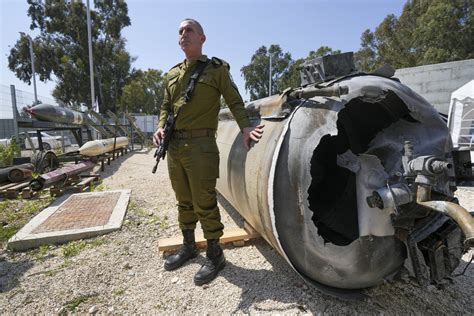
Iran launched a barrage of missiles and drones toward Israel late Saturday in retaliation for a suspected Israeli strike on an Iranian consular building in Syria earlier this month, marking a significant escalation in the long-simmering tensions between the two nations.
Israel is on high alert and bracing for potential further attacks as it assesses the damage and coordinates its response with allies, including the United States. The Israeli military confirmed that its air defense systems, along with assistance from the U.S. and other partners, intercepted the vast majority of the incoming projectiles.
The attack, which Iran has framed as a legitimate act of self-defense under Article 51 of the UN Charter, has heightened fears of a wider regional conflict. The Israeli military stated that the majority of the incoming threats were intercepted outside of Israeli airspace. However, some missiles did impact Israeli territory, causing minor damage to a military installation. There were no reported casualties directly resulting from the missile strikes.
Details of the Attack and Defense
The attack unfolded over several hours, beginning with the launch of dozens of drones followed by waves of cruise missiles and ballistic missiles. The coordinated assault was designed to overwhelm Israeli air defenses and inflict maximum damage.
“We are prepared for any scenario,” Israeli military spokesman Rear Adm. Daniel Hagari said in a televised statement. He confirmed that the country’s air defense systems, including the Iron Dome, David’s Sling, and Arrow systems, were actively engaged in intercepting the incoming threats.
The United States played a crucial role in assisting Israel’s defense. U.S. Central Command forces intercepted dozens of missiles and drones launched from Iran, Iraq, Syria, and Yemen, according to a U.S. defense official. President Biden reaffirmed the U.S.’s “ironclad” commitment to Israel’s security and convened a meeting of the National Security Council to address the situation.
The United Kingdom and France also condemned the Iranian attack and pledged their support for Israel’s security. British fighter jets reportedly assisted in intercepting some of the incoming drones and missiles.
Iranian Justification and Warnings
Iran’s mission to the United Nations stated that the attack was in response to Israel’s strike on the Iranian consulate in Damascus on April 1, which killed several high-ranking Iranian military officials, including a top commander in the Islamic Revolutionary Guard Corps (IRGC).
“Conducted on the strength of Article 51 of the UN Charter pertaining to legitimate defense, Iran’s military action was in response to the Israeli aggression against our diplomatic premises in Damascus,” the Iranian mission said in a statement. “The matter can be deemed concluded. However, should the Israeli regime make another mistake, Iran’s response will be considerably more severe.”
Iran also warned other countries, particularly the United States, to stay out of the conflict. “Iran’s military action was in exercise of its inherent right to self-defense as outlined in Article 51 of the UN Charter, and was in response to the Israeli recurring military aggressions, particularly its armed attack on 1 April 2024 against Iranian diplomatic premises, in defiance of international law,” the Ministry of Foreign Affairs of the Islamic Republic of Iran said in a statement. It further cautioned the U.S. “to stay away” to avoid further escalation.
International Reaction and Condemnation
The Iranian attack has drawn widespread condemnation from world leaders and international organizations. United Nations Secretary-General Antonio Guterres condemned the attack and called for an immediate cessation of hostilities.
“I am deeply alarmed about the very real danger of a devastating region-wide escalation. I urge all parties to exercise maximum restraint to avoid any action that could lead to major military confrontation on multiple fronts in the Middle East,” Guterres said in a statement.
European Union foreign policy chief Josep Borrell described the situation as “an unprecedented escalation” and called for de-escalation. “The EU strongly condemns the Iranian attack on Israel. This is an unprecedented escalation and a grave threat to regional security,” Borrell said.
Many countries, including Canada, Germany, and France, issued statements condemning Iran’s actions and expressing solidarity with Israel.
Potential for Escalation and Regional Conflict
The attack has raised concerns about a potential full-blown regional conflict. Israel has vowed to respond to the Iranian attack, and the nature and scope of that response could determine whether the situation spirals out of control.
“We will respond when the time is right,” Israeli Prime Minister Benjamin Netanyahu said in a statement. He thanked the United States and other allies for their support and emphasized Israel’s right to defend itself.
The involvement of other regional actors, such as Hezbollah in Lebanon and Iranian-backed militias in Iraq and Syria, further complicates the situation. Any miscalculation or escalation could quickly draw these groups into the conflict, leading to a wider regional war.
The Israeli Perspective
From the Israeli perspective, the Iranian attack represents a direct assault on its sovereignty and security. Israel views Iran as its primary adversary and accuses it of supporting terrorist groups and destabilizing the region.
The Israeli government has long maintained a policy of ambiguity regarding its nuclear program, neither confirming nor denying its existence. However, Israel has repeatedly stated that it will not allow Iran to develop nuclear weapons.
The attack on the Iranian consulate in Damascus was widely attributed to Israel, although Israel has not officially claimed responsibility. The strike was seen as a preemptive measure to disrupt Iranian operations in Syria and prevent the transfer of advanced weapons to Hezbollah.
The Iranian Perspective
From the Iranian perspective, the attack on its consulate in Damascus was a violation of international law and an attack on its sovereignty. Iran argues that it has a right to respond to such aggression and to defend itself against Israeli threats.
Iran accuses Israel of being a destabilizing force in the region and of supporting terrorist groups that target Iran and its allies. Iran also views Israel’s nuclear program as a threat to its security and has called for the establishment of a nuclear-free zone in the Middle East.
Iran’s Supreme Leader Ayatollah Ali Khamenei has repeatedly vowed to retaliate for the killing of Iranian military officials in Syria. The missile and drone attack on Israel was seen as the fulfillment of that promise.
The Role of the United States
The United States has long been a staunch ally of Israel and has provided it with significant military and financial assistance. The U.S. has also worked to counter Iranian influence in the region and to prevent Iran from developing nuclear weapons.
President Biden has reaffirmed the U.S.’s commitment to Israel’s security and has pledged to stand by Israel in the face of Iranian aggression. However, the U.S. has also urged Israel to exercise restraint and to avoid any actions that could further escalate the conflict.
The U.S. is walking a tightrope, seeking to deter Iran while also preventing a wider regional war that could draw the U.S. into another costly and protracted conflict in the Middle East. The U.S. has deployed additional military assets to the region in recent weeks, including warships and fighter jets, to deter Iran and to protect U.S. forces.
Impact on the Region and Global Implications
The Iranian attack on Israel has far-reaching implications for the Middle East and the world. The attack has heightened tensions between Israel and Iran and has raised the risk of a wider regional conflict.
The attack could also disrupt oil supplies and increase energy prices. The Middle East is a major source of oil, and any disruption to oil production could have a significant impact on the global economy.
The attack has also raised concerns about the proliferation of weapons of mass destruction. If Iran feels threatened, it could accelerate its nuclear program, leading to a regional arms race.
Diplomatic Efforts and Potential for De-escalation
Despite the escalating tensions, there are still some diplomatic efforts underway to de-escalate the situation. The United Nations, the European Union, and other international actors are working to mediate between Israel and Iran and to prevent a wider conflict.
However, the prospects for a diplomatic solution are uncertain. Both Israel and Iran have hardened their positions, and it is unclear whether either side is willing to compromise.
The key to de-escalation may lie in finding a way for both sides to save face. Israel may need to refrain from a large-scale retaliatory strike, while Iran may need to signal that it is willing to de-escalate if Israel does not take further military action.
Future Scenarios and Potential Outcomes
Several potential scenarios could unfold in the coming days and weeks.
-
Scenario 1: Limited Retaliation: Israel responds to the Iranian attack with a limited military strike against Iranian targets in Syria or Lebanon. This could be designed to deter further Iranian aggression without provoking a full-scale war.
-
Scenario 2: Full-Scale War: Israel launches a major military offensive against Iran, targeting its nuclear facilities, military bases, and other strategic assets. This could trigger a wider regional conflict involving Hezbollah, Iranian-backed militias, and other regional actors.
-
Scenario 3: Diplomatic De-escalation: The United States and other international actors successfully mediate between Israel and Iran, leading to a de-escalation of tensions and a return to the status quo ante.
-
Scenario 4: Proxy War: Israel and Iran continue to engage in a proxy war, using Hezbollah and other proxy groups to attack each other’s interests. This could lead to a prolonged period of instability and violence in the region.
The most likely outcome is a period of heightened tensions and sporadic violence, with both sides seeking to deter the other from taking further military action. However, the risk of a full-scale war remains significant.
Analysis of Military Capabilities
The recent exchange highlights the significant military capabilities possessed by both Iran and Israel.
- Iran’s Military Strength: Iran’s military doctrine relies heavily on asymmetric warfare, designed to counter the superior conventional forces of its adversaries. Its arsenal includes a large number of ballistic missiles, cruise missiles, and drones, which were prominently displayed in the recent attack. Iran also possesses a sophisticated cyber warfare capability and a network of proxy groups throughout the region, including Hezbollah in Lebanon and various militias in Iraq and Syria. These proxy groups allow Iran to project power beyond its borders and to engage in deniable operations against its adversaries.
- Israel’s Military Strength: Israel possesses one of the most advanced militaries in the world, equipped with cutting-edge technology and weaponry. Its air force is particularly strong, with a fleet of advanced fighter jets and attack helicopters. Israel also has a sophisticated air defense system, including the Iron Dome, David’s Sling, and Arrow systems, which proved effective in intercepting the majority of the incoming Iranian projectiles. In addition to its conventional forces, Israel is believed to possess a nuclear arsenal, although it has never officially confirmed this.
Cyber Warfare as a Potential Battlefield
In addition to conventional military operations, cyber warfare is likely to play an increasingly important role in the conflict between Israel and Iran. Both countries possess sophisticated cyber capabilities and have been accused of launching cyberattacks against each other in the past.
Cyberattacks could be used to disrupt critical infrastructure, steal sensitive information, or spread propaganda. They could also be used to target military systems, such as air defense networks or command and control centers.
The use of cyber warfare could escalate the conflict and make it more difficult to control. It could also lead to unintended consequences, such as the disruption of civilian infrastructure or the accidental triggering of a military response.
The Economic Impact of the Conflict
The conflict between Israel and Iran could have significant economic consequences, both for the region and for the world.
- Oil Prices: The Middle East is a major source of oil, and any disruption to oil production could lead to a sharp increase in oil prices. This could have a negative impact on the global economy, as higher energy costs would increase inflation and reduce economic growth.
- Trade and Investment: The conflict could also disrupt trade and investment in the region, as businesses become reluctant to operate in an unstable environment. This could lead to a decline in economic activity and job losses.
- Tourism: The conflict could also have a negative impact on tourism, as travelers avoid the region due to security concerns. This could hurt the economies of countries that rely heavily on tourism revenue.
The Humanitarian Crisis
A full-scale war between Israel and Iran could lead to a major humanitarian crisis. Millions of people could be displaced from their homes, and many could be killed or injured.
The conflict could also disrupt the delivery of humanitarian aid, making it difficult to provide assistance to those in need. The international community would need to be prepared to respond to a large-scale humanitarian emergency.
The Importance of International Law
The conflict between Israel and Iran raises important questions about international law.
- The Use of Force: The UN Charter prohibits the use of force against another state, except in self-defense or with the authorization of the UN Security Council. Iran has argued that its attack on Israel was an act of self-defense, as it was responding to the Israeli strike on its consulate in Damascus. However, Israel has argued that Iran’s attack was a violation of international law, as it was not proportionate to the threat posed by the Israeli strike.
- The Protection of Civilians: International law requires all parties to a conflict to take all feasible precautions to protect civilians from harm. This includes avoiding attacks on civilian targets and taking steps to minimize civilian casualties.
- Accountability for War Crimes: International law also provides for accountability for war crimes. Individuals who commit war crimes, such as deliberately targeting civilians or using prohibited weapons, can be prosecuted by international courts.
The Long-Term Implications
The conflict between Israel and Iran is likely to have long-term implications for the Middle East and the world.
- The Balance of Power: The conflict could alter the balance of power in the region, as different countries and groups seek to take advantage of the instability.
- The Spread of Extremism: The conflict could also contribute to the spread of extremism, as radical groups exploit the chaos and violence to recruit new members.
- The Future of the Nuclear Deal: The conflict could also complicate efforts to revive the Iran nuclear deal, as tensions between Iran and the West increase.
The Role of Social Media and Disinformation
Social media is playing an increasingly important role in the conflict between Israel and Iran. Both countries are using social media to spread propaganda, recruit supporters, and conduct cyberattacks.
Disinformation is also a major problem, as false or misleading information is spread online to manipulate public opinion and incite violence. Social media companies are struggling to combat disinformation, and it is likely to continue to be a major challenge in the future.
The Need for Diplomacy and Dialogue
Despite the escalating tensions, it is important to remember that diplomacy and dialogue are still possible. The international community must continue to work to mediate between Israel and Iran and to find a peaceful resolution to the conflict.
This will require both sides to be willing to compromise and to engage in constructive dialogue. It will also require the international community to be united in its efforts to promote peace and stability in the region.
Frequently Asked Questions (FAQ)
Q1: Why did Iran attack Israel?
A1: Iran launched the attack in retaliation for a suspected Israeli strike on its consulate in Damascus, Syria, on April 1, which resulted in the deaths of several high-ranking Iranian military officials, including a top commander in the Islamic Revolutionary Guard Corps (IRGC). Iran framed the attack as an act of self-defense under Article 51 of the UN Charter.
Q2: What was Israel’s response to the attack?
A2: As of the time of this writing, Israel had not yet launched a major retaliatory strike but has vowed to respond. Prime Minister Benjamin Netanyahu stated that Israel would respond “when the time is right.” The Israeli military, with assistance from the U.S. and other allies, focused on intercepting the incoming missiles and drones.
Q3: What role did the United States play in the defense against the attack?
A3: The United States played a crucial role in assisting Israel’s defense. U.S. Central Command forces intercepted dozens of missiles and drones launched from Iran, Iraq, Syria, and Yemen. President Biden reaffirmed the U.S.’s “ironclad” commitment to Israel’s security.
Q4: What are the potential consequences of this attack?
A4: The attack has heightened fears of a wider regional conflict. Potential consequences include a full-scale war between Israel and Iran, involvement of other regional actors like Hezbollah, disruptions to oil supplies, increased energy prices, a potential humanitarian crisis, and further instability in the Middle East.
Q5: What is the international community’s reaction to the attack?
A5: The Iranian attack has drawn widespread condemnation from world leaders and international organizations. United Nations Secretary-General Antonio Guterres condemned the attack and called for an immediate cessation of hostilities. The European Union, along with many countries including Canada, Germany, and France, issued statements condemning Iran’s actions and expressing solidarity with Israel.









